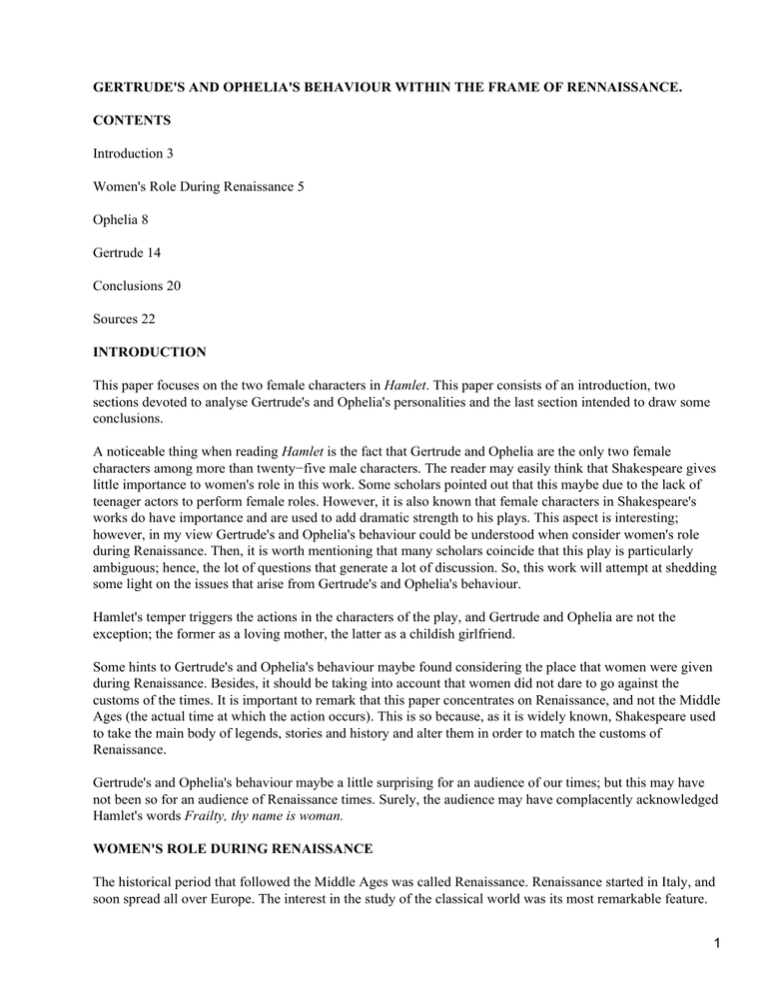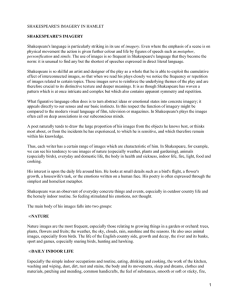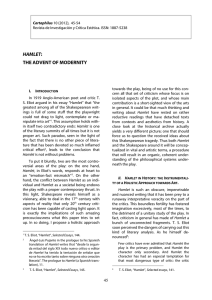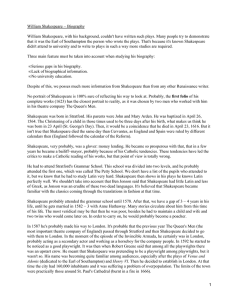GERTRUDE'S AND OPHELIA'S BEHAVIOUR WITHIN THE FRAME OF RENNAISSANCE. CONTENTS INTRODUCTION Introduction 3
Anuncio

GERTRUDE'S AND OPHELIA'S BEHAVIOUR WITHIN THE FRAME OF RENNAISSANCE. CONTENTS Introduction 3 Women's Role During Renaissance 5 Ophelia 8 Gertrude 14 Conclusions 20 Sources 22 INTRODUCTION This paper focuses on the two female characters in Hamlet. This paper consists of an introduction, two sections devoted to analyse Gertrude's and Ophelia's personalities and the last section intended to draw some conclusions. A noticeable thing when reading Hamlet is the fact that Gertrude and Ophelia are the only two female characters among more than twenty−five male characters. The reader may easily think that Shakespeare gives little importance to women's role in this work. Some scholars pointed out that this maybe due to the lack of teenager actors to perform female roles. However, it is also known that female characters in Shakespeare's works do have importance and are used to add dramatic strength to his plays. This aspect is interesting; however, in my view Gertrude's and Ophelia's behaviour could be understood when consider women's role during Renaissance. Then, it is worth mentioning that many scholars coincide that this play is particularly ambiguous; hence, the lot of questions that generate a lot of discussion. So, this work will attempt at shedding some light on the issues that arise from Gertrude's and Ophelia's behaviour. Hamlet's temper triggers the actions in the characters of the play, and Gertrude and Ophelia are not the exception; the former as a loving mother, the latter as a childish girlfriend. Some hints to Gertrude's and Ophelia's behaviour maybe found considering the place that women were given during Renaissance. Besides, it should be taking into account that women did not dare to go against the customs of the times. It is important to remark that this paper concentrates on Renaissance, and not the Middle Ages (the actual time at which the action occurs). This is so because, as it is widely known, Shakespeare used to take the main body of legends, stories and history and alter them in order to match the customs of Renaissance. Gertrude's and Ophelia's behaviour maybe a little surprising for an audience of our times; but this may have not been so for an audience of Renaissance times. Surely, the audience may have complacently acknowledged Hamlet's words Frailty, thy name is woman. WOMEN'S ROLE DURING RENAISSANCE The historical period that followed the Middle Ages was called Renaissance. Renaissance started in Italy, and soon spread all over Europe. The interest in the study of the classical world was its most remarkable feature. 1 The relationship between the individual and the outside world, along with an enhanced view of the individual reasoning were an outstanding feature of this period. Regarding education, the development of personal skills and objectivity was importantly emphasised; since education aimed at forming a complete individual, competent in many fields of knowledge. From the evidence collected by scholars (letters, marriage contracts), violence and oppression on women is unveiled. Domestic affairs and childbearing were the only issues women were allowed to be concerned with. Women had restricted access to education. Furthermore, writing and reading for women were thought to be useless because the main objective of education for them was to serve the husband and to keep the house. Legally, women were also in disadvantage. They were considered another possession of their husbands: once married their belongings along with themselves became their husbands' property. Besides, husbands were allowed to beat their wives when they considered necessary some correction. Regarding marriage, most women were married at the age of 15 or 16, and life expectancy for women was no more than 30 years. Political, strategic or commercial reasons motivated marriages within high−class people. So, marriage depended to a great extent on the wealth and social position of the bride to be. Negotiations for royal marriages often took many years to finalise. They usually began during the childhood of one or both of the potential couple. Royal courtship consisted of formal letters declaring love and symbolic gifts, usually jewellery. Usually the royal couple couldn't meet because of the distance. Kings had to rely on descriptions by ambassadors, and portraits painted by court painters. Marriage moved by love was seen a foolishness. Generally, queens were powerful, however, the real power was hold by their husbands. Wealth and social rank were not the only requisite for marriage. Women had to be quiet, shy, gentle and caring about her husband. Thus, women played a passive role within the couple and fulfilling the aforesaid requisites was thought to be a God's present. Low−class women helped their familiar economy generally by working along with their husbands, for half a salary. Furthermore, they were also in charge of the childbearing and the housekeeping. Women in higher classes were devoted to procreate heirs in order to keep the lineage. Unmarried women just had one option: secluding in nunnery. Submission on the part of women was mandatory; this idea was shared and supported not only by society but also by the church, which considered submission a virtue. Thus, men of their own family ruled women's childhood and adolescence; eventually, women carried out their adult life under the authority of their husbands. Also, apart from all the requisites aforementioned, virginity played a role of outmost importance. Virginity was a dramatic issue in the life of women. Since losing virginity meant missing chances of a convenient marriage, the men of the family closely watched this condition. In this way, sex outside the matrimony sphere was thought of as sinful and base; on the contrary, sex inside the matrimony was considered pure. To sum up, Renaissance society was a patriarchal one. John Knox, a contemporary scholar and one of the most important voices of Reformation, reflects the notion about women during Renaissance: Woman in her greatest perfection was made to serve and obey man. OPHELIA Ophelia is seen for the first time in Hamlet when she is talking to her brother, Laertes. Laertes warns her about Hamlet, and he also shows some concern about Ophelia's chastity: Then weigh what loss your honour may sustain, If with too credent ear you list his songs, 2 Or lose your heart, or your chaste treasure open, To his unmastered importunity (I iii) Laertes' words reflect one of the main concerns of men of those times as it was mentioned before. At the same time, Laertes'words: His greatness weighed, his will is not his own For he himself is subject to his birth He may not, as unvalued persons do Carve for himself, for on his choice dependes The safety and health of this whole state (I iii) reflect the nature of marriages within high class people. Besides we have to remember that she was a royal advisor's daughter; however not noble enough to Hamlet, who was a prince. So, maybe she realised this and this is one of the reasons why she may have known that her love might have never worked. Nonetheless, her father also advises Ophelia. Polonius demands obedience on her; Polonius aims not only at preserving Ophelia's virginity, but mot importantly he wants to save his own honour. Polonius and Lartes are troubled because they know how things go in the court. It is worth noticing that Ophelia has a strong bond with her brother but her relationship with her father seems a little strained. At this point, these dialogs reveal Ophelia's image. Polonius and Laertes call for obedience and submission to their commands; they think of Ophelia as an inexperienced and childish girl: Affection! Pooh! You speak like a green girl Unsifted in such perilous circumstance (I iii) No matter how true she might be when she says that she loves Hamlet, she knows her father's temper. This is reflected by her prudence when telling him about her affair with Hamlet. Ophelia's self acknowledged submission is reflected in her own attitude: I shall obey, my Lord. Furthermore, her self acknowledged submission is reassured when she says: ...,as you did command I did repel his letters, and denied His access to me (II ii) Regarding this scene, a critical work state that: ...her face may look innocent...but this only proves her falseness, that, like his father, she can appear loving and then immediately change her behaviour...Finally, even in this scene she fails him, for she stands with mute terror at the sight of his anguish and does nothing to try to understand or calm him. In my view, the previous statement is unfair. Urged on by her father, Ophelia left the man she loves the most. This situation caused her to meet with two situations: either going against her own father, or facing a Hamlet's madness. From my point of view, Ophelia's perturbation arises from her condition of woman, plugged to her 3 short age (she might have surely been no more than 15 or 16). Eventually, Polonius, ironically, admits an error of judgement regarding Hamlet; nonetheless, he does nothing about it. Ophelia's total and self acknowledged submission reaches its climax when completely unaware she takes part in Polonius' and Claudius' plot to make Hamlet talk. However, even though she may look like a puppet, she gets showing her feelings towards Hamlet. She feels pity for Hamlet, and at the same time she feels bitterly disappointed because Hamlet shares none of his inner thoughts, or his sorrows with her. This is why she claims about this situation the following: Rich gifts wax poor when givers prove unkind (III i). With these words, Ophelia disconsolately gives up her hopes about a possible marriage with Hamlet. To make matters worse, Hamlet rejects her claiming I loved you not (III i). However, no matter the brutality of these words, Opehelia's love remains the same, and this is reflected by her honest claim: O, help him, you sweet heavens! (III i)O heavenly powers, restore him (III i) At this point, it is worth noticing that Hamlet becomes the spokesman of the prejudices of Renaissance society: Be thou chaste as ice, as pure as snow, thou shalt not escape calumny (III i), That if you be honest and fair, your honesty should admit no discourse to your beauty. Also, he suggests that the beauty of women is a sort of trap that traps the virtue of men the power of beauty...transform honesty from what is bawd. His remarks to Ophelia are cruel but include a certain amount of self−reproach, as well. Besides, he suggests that men are deceitful we are arrant knaves all; believe none of us. Hamlet's attack on Ophelia is indeed closely linked to the image he has of his mother and all other women. This is reinforced by his words Frailty, thy name is woman. In this way, Hamlet is not addressing to Ophelia as an individual, she has become a representative of all women. His mother's betrayal of the memory of his father understandably distorts Hamlet's idealised view of women in general, he projects his disgust with his mother onto Ophelia, his sentiments have more to do with his anger at his mother than with anything that Ophelia has said or done. At last, Ophelia becomes as the target and frustration, which Hamlet feels for his mother. Scene v, Act IV shows a different Ophelia. It is easy to understand what drove her mad. Ophelia has lost the man she loves the most; moreover, now she has to endure another loss: Polonius' death. Moreover, Laertes, the only person to whom she might have asked for help when she needed it the most, was not by her side. Thus, all of these troubles come down heavily on the weak Ophelia; hence, she collapses beaten by reality. Polonius, Laertes, and Hamlet, the men who are supposed to rule her life are no longer with her. They shaped her life, and she has no a mind of her own; so, inevitably she fatally clashes with reality. We could blame them because they did not allow Ophelia to rely upon her own judgement, substituting their own feelings and ideals and manipulating her, but we have to take into account the prejudices with regard women during those times. So insanity is the only way she has to escape from the agony of her life. In spite of the fact that Ophelia is out of her mind, she transmits her feelings and ideas thought the flowers and songs. Her songs express what she feels about Hamlet's absence and Polonius' death. The song of the rejected woman comes forcefully out from her lips, and at the same time is her peculiar way to deal with her sexual restraint. Regarding the flowers, they undoubtedly carry a message for all those who receive them. She gave to Laertes rosemary and pansies for remembrance and thoughts; columbine and fennel to Claudius for unfaithfulness and flattery; and rue to Gertrude for repentance. She decides to wear daisies, which stand for deception in love affairs and wishes to give violets to Horatio for loyalty but she remarks they withered all when my father died (IV v) Eventually, Laertes comes at once; he has come on time to revenge Polonius' death, unfortunately he has come too late to help his sister. The image of an insane and hopeless Ophelia turns Laertes suffering into wrath. Moreover, Laertes' wrath gets stronger after Ophelia's death. 4 The causes of Ophelia's death remain unclear. On one hand, Gertrude states that Ophelia loses her life because she drowned. On the other, the undertaker's conversation reveals a possible suicide: Is she to be buried in Christian burial that wilfully seeks her own salvation? (V i). Hamlet's words add stress to this suspicion, too: The queen, the courtiers. Who is that they follow? And with such maimed rites? This doth betoken The corse they follow did with desperate hand Fordo its own life. `Twas od some estate. (V i) There is something strange about the burial, since ecclesiastical authorities also think that Opehelia has killed herself. However, Ophelia was a member of the court and Gertrude because her love toward Ophelia, overruled the church, and had Ophelia buried in the holy graveyard. A last element that makes probe her suicide is the priest's speech: Her obsequies have been as far enlarged As we have warranty. Her death was doubtful; And, but that great command o'erswaysthe order, She should in ground unsanctified have lodged Till the last trumpet; for charitable players, Shards, flints, and pebbles should be thrown on her. Yet here she is allowed her virgin crants, Her maiden strewments, and the bringing home Of bell and burial. (V i) Ophelia's death arise a question; Gertrude's description of Ophelia's death is very detailed. Maybe possible that Gertrude has something to do with Ophelia's death? Perhaps Gertrude's sorrow and concern about her suicide maybe pure pretence. If this be so, what on earth may have pushed Gertrude into involving with this crime? In my view, Ophelia commits suicide, as evidenced by the speeches of the other characters; and, the detailed description made by Gertrude is a dramatic device Shakespeare uses in order to get the audience aware of the facts. This dramatic device was used in the times of classic Greek drama, where a messenger was always in charge of informing the audience about facts that were important for the play, but were difficult to carry out on stage (e.g. the result of a battle) GERTRUDE The main question that arises from Gertrude's behaviour is concerned with her hasty marriage after King Hamlet's death. Her motives remain difficult to understand; however, undoubtedly, the royal advisors had something to do. This fact unveils the political importance of this marriage. In mediaeval Denmark, not necessarily Hamlet should have been obliged to succeed his father. Gertrude may have remained a widow. Claudius could have been crowned; and as it was usual during Renaissance, he might have easily married another foreign noble. This aforesaid makes me think that during King Hamlet's life, Gertrude and Claudius 5 had already had an affair. Furthermore, when she talks to Hamlet the first, she asks him to be kind to Claudius. In my view, had not she felt something about Claudius, she my have never done such request: let thine eye look like a friend on Denmark (I ii). Not to mention that in those times marriages were set; hence, it is quite unlikely that there might have been love between King Hamlet and Gertrude, as Hamlet believes there was. Gertrude's words during the play within the play: The lady doth protest too much, methinks (III ii) reveal her ambiguous ideas about faithfulness in marriage. To my thinking, Gertrude just want to be happy besides the man she loves, and at the same time, she wants to keep her beloved son by her side. Adultery may not sound queer taking into account that men ruled mercilessly over women. Curiously, Claudius is very kind towards Gertrude. Gertrude's words reveal guiltiness when she talks about her hasty marriage; since her state as a heart broken widow was too short. So, an aspect of Gertrude's personality is brought to light. Gertrude is not only strong enough to face rumours and prejudices, but also she shows intelligence and common sense when she asks Polonuis: More matter, with less art. Though Gertrude might hope that is love what disturb the Prince, deep inside herself she is able to discern that King Hamlet's death along with her hasty marriage are the real causes of Hamlet's condition. The Queen's words, And for your part, Ophelia, I do wish That your good beauties be the happy cause Of Hamlet wildness. So shall I hope your virtues Will bring him to his wonted way again, To both your honours(III i) show that she is not only concerned about Claudius, but also about Hamlet and Ophelia. The dumb show is a highly important point in the play. This arises another important question about the Queen: did she know Claudius' plans? In my view, Gertrude did not know anything about the murder. Gertrude's guiltiness is related to her hasty marriage but not murder. Besides, she seems unaware to many of Claudius' evil plots (i.e. the execution of Hamlet in England or Laertes' revenge) and she seems truly concerned about Hamlet madness and honestly believes that it is caused by his father's death and her o'erhasty marriage. The ghost put some light on this issue. When the ghost talks to Hamlet, it tells Hamlet about the murder, and Gertrude is never mentioned; furthermore, the ghost tells Hamlet to forgive and understand the Queen; twice the ghost does this recommendation: But, however thou pursuest this act, Taint not thy mind, nor let thy soul contrive Against thy mother aught. Leave her to heaven And to those thorns that in her bosom lodge (I v) Later, the ghost turns up to protect Gertrude from Hamlet's rage: Do not forget: this visitation Is but t whet thy almost blunted purpose 6 But, look , amazement on thy mother sits. O, step between her and her fighting soul− Conceit in weakest bodies strongest works− Speak to her, Hamlet (III iv) Besides, ghosts in Shakespere's plays, were only seen by the people directly involved in the crime (e.g. Julius Caesar and Macbeth). Hamlet takes the decision to stage the play within the play (scene ii, act III ) in order to unmask Claudius; however, the play focuses on the Queen's behaviour rather than the King's assassination. Scene four shows us how Hamlet mistreats his mother to the point that the ghost appears to calm Hamlet down. The aforesaid and Hamlet's procrastination reveal, in my view, that Hamlet's main concern is the Queen's behaviour. He had idealistic ideas concerning her virtue and expected more from her. We have to remember his reflections about men: What a piece of work man! How noble in reason! How infinite in faculty...in apprehension like a god! The parangon of animals! (II ii). After he realises her baseness, he was distressed by the realisation that his ideals were unrealistic. It is hard for him to forgive Gertrude, he could not attempt to understand her actions. Eventually, the Prince and the Queen are able to come to terms with each other (One more word, good lady), and Gertrude promises him not to keep Claudius as away from her as possible: Be thou assured, if words be made of breath And breath of life, I have no life to breathe What thou hast said to me (III iv) After this situation is overcome, Hamlet acquires the necessary boost to carry out his revenge. Also, Gertrude's Hamlet with Hamlet reveals that she feels remorse about her marriage with Claudius. Hamlet's claims echoes Gertrude's conscience: O Hamlet, speak no more. Thou turn'st mine eyes into my very soul; And there I see such black and greined spots As will not leave their tinct (III iv) These words not only bring to light guiltiness, but also they are lacerating: O, speak to me no more; These words, like daggers, enter in mine ears; No more, sweet Hamlet! (III iv) This is Gertrude's turning point. She has been avoiding to look into her own soul in an attempt not to face her 7 own weakness and the fact that she can not have what she really want: unity and peace. Hamlet manages to turn her eyes into her soul and see the black and grained spots (III iv). This is why I think that Gertrude promises Hamlet not to sleep any longer with Claudius. Hamlet's words bring Gertrude to the reality in which women had to under the authority of men. The Queen's love for Hamlet makes her take this decision; Gertrude's inner conflict wore her out, so she finally finds some peace after her deal with the Prince. However, their deal is somewhat like a plot. For instance, when Claudius is looking for Hamlet, Gertrude tells the king about Polonius' death trying to soften the news: To draw apart the body he hath killed, O'er whom his very madness, like some ore Among a mineral of metals base, Shows itself pure; he weeps for what is done (IV i) Furthermore, it is well known that Hamlet feel no remorse about Polonius' death, he even derides the corpse: ....Indeed, this counsellor Is now most still, most secret, and most grave, Who was in life a foolish prating knave. [To the body] Come, sir, to draw toward an end with you− (III iv) Gertrude's problem may never be overcome just by appeasing her conscience. Her feelings about Hamlet do not match what she feels for Claudius. Claudius thinks of Hamlet as a threaten, so he plots to kill him; Gertrude is quite aware of Claudius' machination. Gertrude calms Laertes down when he comes back intended to revenge his father; urged on, at Laertes' demands she smartly answers that Claudius was not the killer. In other words, she protects Claudius and covers Hamlet at the same time. It is impossible to support both of these positions; and this situation discloses Gertrude's main problem: the incapability of conciliating two loves. Finally, she comes to the conclusion that she has to do something, and she is fatally drag by the circumstances. Polonius' death not only has political implications but also triggers Ophelia's condition. Gertrude does not wish to meet Opehelia but I think that this is not a lack of sympathy but the fear of glimpsing her own breakdown after the conversation with Hamlet. Her words reflect this situation: Let her come in To my sick soul, as sin's true nature is, Each toy seems to prologue to some great amiss (IV v) Nevertheless, Gertrude's attitude, later on, shows her fondness towards Ophelia, especially at the burial: [Scattering flowers] Sweets to the sweet. Farewell! I hoped thou shouldst have been my Hamlet's wife; 8 I thought thy breide−bed to have decked, sweet maid, And not have strewed thy grave (V i) Rephrasing Claudius When sorrows come, they come not in single spies but in battalions! (IV v). Claudius and Laertes plot to eliminate Hamlet. Claudius pours some poison in a cup of wine intended to Hamlet; unfortunately, Gertrude, excited by Hamlet's performance during the duel, raises the cup and has the fatal liquor. Her words show her love and proud of Hamlet: He's fat, and scant of breath. Here, Hamlet, take my mapkin, rug thy brows. The queen carouses to thy fortune, Hamlet (V ii) Come, let me wipe thy face (V ii) Ironically, the wife is victimised in the same way her late husband was. CONCLUSIONS This section is intended to summarise the most outstanding features of the characters here analysed. Ophelia's role is a passive one. She is an obedient daughter; she is so much influenced by Polonius that she can never go against his will. She always shows love and concern about Polonius; this is why she does as he says, without complaining any. Ophelia's attitude towards Polonius and the Prince uncover her lack of self−esteem. However, she can not be blamed about the aforesaid, because she is too young and inexperienced; nevertheless, her own shortcoming make her the more honest and true of all characters in the play. Again, her own shortcomings cause her to be trapped between her father's will and her love for Hamlet. Hamlet's condition and her own problems come down heavily on her; unfortunately Polonius is murdered, and Ophelia has to bear this situation alone. Because her position in the court, she is not allowed, by the dictates of society, to act in any other manner but a proper young lady. She is the obedient little girl of the nobility who lets her father run her life until madness gives her the freedom to mouth off. Gertrude is also a weak character; because she strongly depends on her husband. She can not control the circumstances that around her. Unlike Hamlet, Gertrude's expressions are shorter and direct: More matter, less art, Methinks the lady doth protest too much, As kill a king. Her expressions make her look sincere. Also, she is a very realistic character: She does want to be happy. She tries to deal with the love she feels for Claudius and for Hamlet; however, this is impossible. No matter how strong she may look, she is incapable of facing hard moments; hence, she lies to herself, and she believes that happiness is coming soon. At a first reading Ophelia may be thought of as a weak character and Gertrude the strong one. Notwithstanding, their actions and reactions unveiled their weakness. Somewhat, somehow these two characters are materialisation of Hamlet's sentence Frailty, thy name is women. Men and prejudices exert a tremendous influence on Ophelia and the Queen; furthermore, men and prejudices tear down their dreams and hopes. Men and prejudices lead all of their actions. They were also victimised by a limited education, the law, set marriages, social conditions, and women's submission; in brief, the patriarchal renaissance society. They cannot be blamed at all about their behaviour. They would have never been able to go against the ways of their society. 9 As a final comment, Ophelia and Gertrude are clear examples of Renaissance women. They show that equality between men and women in any society, at any time, is of outmost importance when it comes to educate human beings within a context of freedom and justice. SOURCES Britannica.com. Britannica Encyclopedia.1999−2000. <www.britannica.com> Crispen, Kelly. Life of women in Tudor England < http://hiwaay.net/~crispen/tudor/tudor_women/index.html> Delaney, Ian. A Short Course on Shakespeare Hamlet .1999 < www.netcouk.co.uk/~iandel/index.html > Ever Reader, The. Online magazine of the Shakespeare. Oxford Society. < http://www.everreader.com/> Gray, Terry A. Mr. William Shakespeare and the Internet.1995−2000. < http://daphne.palomar.edu/shakespeare/> Harrison, G.B. Introducing Shakespeare. Penguin Books. Third Edition (reprinted). 1991. Internet Modern History Sourcebook http://www.fordham.edu/halsall/mod/modsbook.html Kelso, Ruth. Doctrine for the Lady of the Renaissance. University of Illinois Press, 1956 Massi , JM, Ph.D., Psy.D. The Shakespeare Classroom. < http://www.jetlink.net/%7emassij/shakes/>1997−2000. Monarch Notes on Hamlet. Monarch Press. Simon & Schuster. 1964. Microsoft Encarta 99 Encyclopedia. Microsoft Corporation. Pohl, Matt. The Renaissance Battle of the Sexes Online! < http://members.tripod.com/renBOTS/Women/edu.htm> Shakespeare Magazine.1996−2000. < http://www.shakespearemag.com/> Ulen, Amy. Surfing with the Bard.1994−2000. 10 < http://www.ulen.com/Shakespeare/default.htm> Zhao, Megan Mofei . Women Artists of the Renaissance.1997−2000. < http://info−center.ccit.arizona.edu/~ws/ws200/fall97/grp13/part3.htm > Crispe, Kelly. Life of Women in Tudor England. Life of Women in Tudor England. Quotate from John Knox's First Blast of the Trumpet aginst Monstrous Regiment of Women. 1558. Monarch Notes. Monarch Press. Simon & Schuster. 1964. 11



